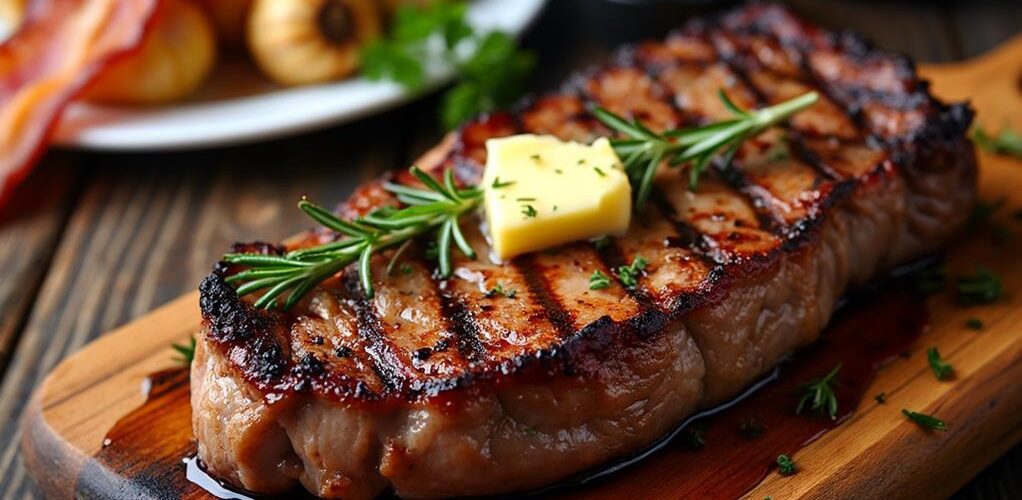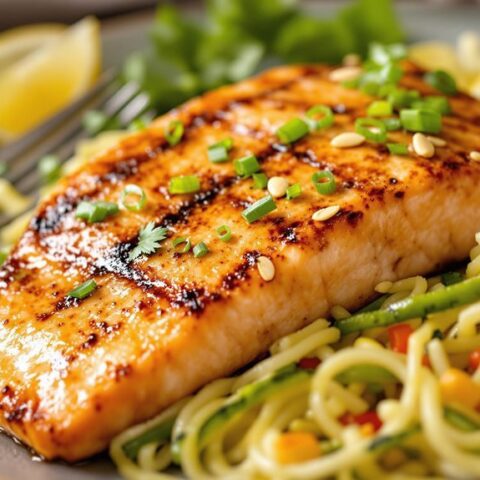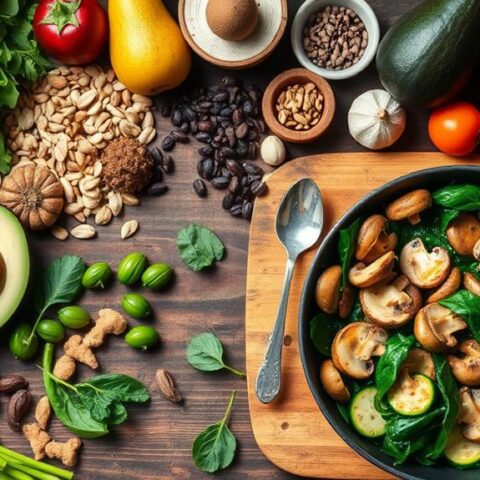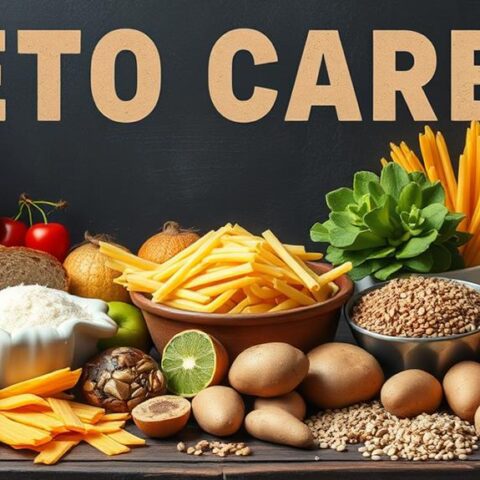
For a balanced keto diet, consider incorporating grass-fed beef, pasture-raised pork, wild-caught salmon, free-range chicken, and lamb chops. Grass-fed beef provides protein and heart-healthy omega-3 fatty acids. Pasture-raised pork is nutrient-dense, rich in omega-3s and selenium. Wild-caught salmon offers high-quality protein and substantial omega-3s, crucial for cardiovascular health. Free-range chicken is an excellent protein source with enhanced nutrient profiles. Lamb chops deliver essential B vitamins and zinc while being high in omega-3s. Each option supports ketosis, offering zero carbohydrates and a rich intake of beneficial fats and nutrients. Discover how these meats fit into diverse culinary options.
Key Takeaways
- Grass-fed beef is keto-friendly, offering high protein, zero carbs, and enhanced omega-3 fatty acids.
- Pasture-raised pork provides essential nutrients, high protein, and supports ethical farming with higher omega-3 content.
- Wild-caught salmon is ideal for keto, offering high protein, healthy fats, and significant omega-3 fatty acids.
- Free-range chicken delivers high protein, low fat, and supports ethical practices with a superior nutrient profile.
- Lamb chops offer high protein, zero carbs, and essential nutrients, making them suitable for keto diets.
Grass-Fed Beef
Grass-fed beef stands out as a superior choice for individuals following a ketogenic diet due to its robust nutritional profile. Known for being high in protein, with approximately 20g per 100g serving, and containing 13g of fat and 0g carbohydrates, it aligns perfectly with keto guidelines.
Its nutritional benefits are further enhanced by heightened levels of omega-3 fatty acids and conjugated linoleic acid (CLA), which have been linked to heart health and fat loss. Additionally, grass-fed beef is a rich source of essential nutrients, including vitamin B12, iron, and zinc, important for maintaining overall health and supporting muscle function.
Grass-fed beef is also known for its richer taste and higher moisture content. The nutritional superiority of grass-fed beef over grain-fed options can be attributed to the natural diet of the cattle, leading to better nutrient absorption, particularly iron.
For peak health benefits, sourcing meat labeled "100% grass-fed" is recommended. When it comes to cooking techniques, grass-fed beef requires careful preparation to preserve its nutrient density.
Slow cooking methods such as braising or using sous-vide can guarantee the meat remains tender and flavorful while retaining its nutritional integrity. Such methods help in maximizing the health benefits of this keto-friendly protein source.
Pasture-Raised Pork
In the domain of keto-friendly meats, pasture-raised pork emerges as another exceptional choice. Offering approximately 260 calories, 17 grams of protein, and 21 grams of fat per 100-gram serving, it is a nutrient-dense option that aligns well with the macronutrient requirements of a ketogenic diet.
Significantly, pasture-raised pork boasts higher levels of omega-3 fatty acids compared to conventionally raised pork. These omega-3 advantages contribute to improved heart health and reduced inflammation, essential benefits for those adhering to a health-conscious lifestyle.
Additionally, the rich nutrient profile of pasture-raised pork is complemented by the presence of essential minerals such as selenium, which supports brain health and chronic disease prevention.
The sustainability benefits of choosing pasture-raised pork extend beyond individual health. The farming practices involved prioritize animal welfare, allowing pigs to roam freely and forage naturally. This method not only enhances the quality of the meat but also supports environmentally responsible agriculture.
The nutritional profile of pasture-raised pork is further enriched by its content of essential B vitamins, such as B12 and niacin, which are pivotal for energy metabolism and maintaining overall health.
Incorporating pasture-raised pork into a ketogenic diet can also promote satiety, helping individuals maintain their dietary goals. Its rich flavor and health benefits make it a superior choice for those seeking sustainable and nutritious meat options.
Wild-Caught Salmon
Wild-caught salmon, a powerhouse of nutrition, stands out as an exemplary choice for those adhering to a ketogenic diet. This seafood offers an impressive nutritional profile, providing approximately 26 grams of high-quality protein and 11.8 grams of healthy fats per 100 grams, with zero carbohydrates.
These attributes make it an ideal fit for keto enthusiasts seeking to maintain ketosis while enjoying diverse and delicious meals. The health benefits of wild-caught salmon are significant, largely due to its rich omega-3 fatty acid content, offering 1,230 mg per 100 grams. Omega-3s are known for supporting heart health and improving insulin sensitivity, essential factors for those on a ketogenic diet.
Additionally, wild-caught salmon generally contains fewer environmental contaminants compared to farmed varieties, presenting a safer and healthier option. Regarding cooking methods, wild-caught salmon is versatile and can be prepared in numerous ways, including grilling, baking, or incorporating into salads.
These methods not only preserve its nutritional integrity but also enhance its natural flavors, making it a tasty addition to any keto meal plan. Moreover, regular consumption has been linked to improved brain health and disease prevention, underscoring its value in a nutrient-dense diet.
Following a ketogenic diet can help manage blood sugar, and including nutrient-dense foods like salmon supports this dietary approach.
Free-Range Chicken
Embracing free-range chicken as a staple in a ketogenic diet offers multiple health benefits alongside its culinary versatility. As a keto-friendly meat, free-range chicken provides approximately 31 grams of protein and 3.6 grams of fat per 100 grams, with virtually zero carbohydrates, making it an ideal choice for maintaining ketosis.
The nutrient profile of free-range chicken is superior to that of conventionally raised chickens, largely due to the birds' access to outdoor spaces, which enhances their omega-3 fatty acid content. This nutrient boost is vital for promoting heart health and reducing inflammation. Additionally, the keto diet is known for its ability to improve insulin sensitivity, which can be beneficial for those managing Type 2 diabetes.
Moreover, free-range chicken is a rich source of essential vitamins and minerals, including B vitamins like B6 and B12, which are significant for energy metabolism, and phosphorus, which supports bone health.
The versatility of this meat allows it to be seamlessly integrated into a variety of keto recipes, whether grilled, roasted, or included in salads, without sacrificing flavor or texture.
Opting for free-range chicken also supports ethical farming practices, ensuring better animal welfare and potentially offering a superior taste profile. This conscious choice aligns with both health goals and ethical considerations, making free-range chicken an exemplary choice in a keto diet.
Lamb Chops
Following the exploration of free-range chicken, lamb chops emerge as another exceptional option for those adhering to a ketogenic diet. Known for their robust flavor and nutritional density, lamb chops boast an impressive profile with 25g of protein, 20g of fat, and 0g of carbohydrates per 100g serving. This positions them as an ideal choice for maintaining ketosis while ensuring satiety. Additionally, lamb nutrition extends beyond macronutrients; it is a rich source of essential B vitamins, zinc, and selenium, which are crucial for immune support and overall health.
The benefits of lamb chops are further enhanced when sourced from grass-fed animals. These variants possess higher concentrations of omega-3 fatty acids and conjugated linoleic acid (CLA), both of which contribute to cardiovascular health. The versatility of lamb chops in cooking methods allows for an array of culinary experiences. Whether grilled, roasted, or pan-seared, the rich flavor can be accentuated with various seasonings.
| Nutrient | Amount per 100g |
|---|---|
| Protein | 25g |
| Fat | 20g |
| Carbohydrates | 0g |
| Omega-3 & CLA | Higher in grass-fed lamb |
Incorporating lamb chops into a keto meal plan not only enhances flavor but also sustains nutritional balance.
Frequently Asked Questions
What Are the Best Meats for Keto?
Grass-fed beef and pasture-raised chicken are ideal keto meats, delivering high protein and beneficial fats while remaining carb-free. Their nutrient density supports muscle maintenance and overall health, aligning with ketogenic dietary principles for effective weight management.
What Are the Top 10 Keto Foods?
Top 10 keto foods include avocados, nuts, seeds, olive oil, cheese, eggs, leafy greens, berries, and coconut oil, alongside keto snack options like beef jerky. These foods provide healthy fats, essential nutrients, and low-carb benefits.
What Foods Can I Eat Unlimited on Keto?
On a ketogenic diet, unlimited consumption includes low-carb vegetables, which provide essential nutrients, and keto snacks that support energy levels. Additionally, plain, unprocessed meats, fatty fish, and eggs are excellent choices for maintaining ketosis and satiety.
Is Ham Ok on Keto?
Ham can be keto-friendly if it is unprocessed and free from added sugars. With 28g protein and 1g carbohydrates per 100g, it's suitable for low-carb diets. Explore ham recipes while considering ham nutrition for maintaining ketosis.
Conclusion
The incorporation of grass-fed beef, pasture-raised pork, wild-caught salmon, free-range chicken, and lamb chops into a ketogenic diet provides a robust source of high-quality proteins and essential nutrients. These meats, known for their superior fatty acid profiles and lack of added hormones or antibiotics, align with the principles of a health-conscious, low-carbohydrate lifestyle. Consuming these keto-friendly meats supports metabolic health, aids in maintaining ketosis, and contributes to overall nutritional well-being, reinforcing their suitability for a balanced ketogenic regimen.










No Comments